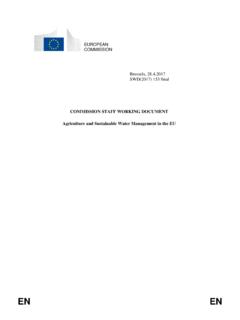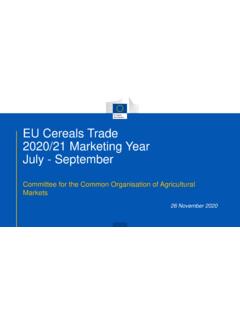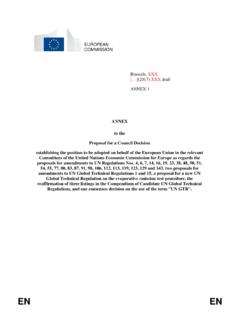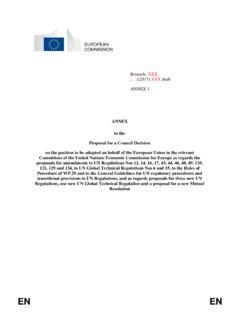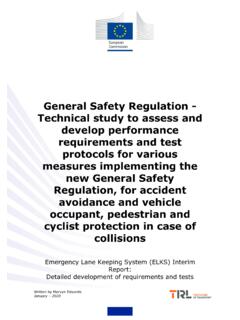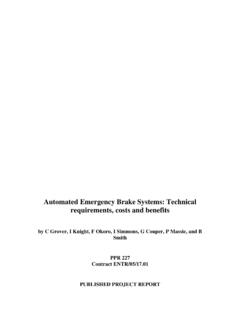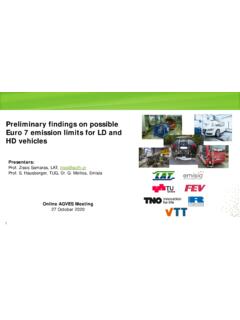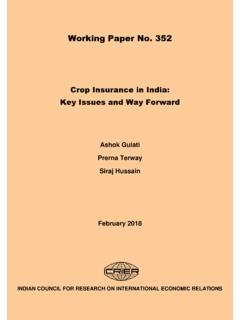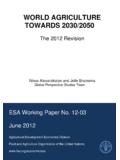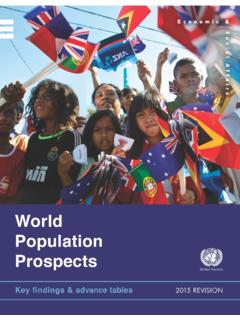Transcription of VALUE ADDED TAX COMMITTEE (ARTICLE 398 OF …
1 Commission europ enne, B-1049 Bruxelles / Europese Commissie, B-1049 Brussel Belgium Tel.: +32 2 299 11 11. EUROPEAN COMMISSION DIRECTORATE-GENERAL TAXATION AND CUSTOMS UNION Indirect Taxation and Tax administration VALUE ADDED tax (2015)2162037 EN Brussels, 6 May 2015 VALUE ADDED TAX COMMITTEE (ARTICLE 398 OF DIRECTIVE 2006/112/EC) working paper NO 856 QUESTION CONCERNING THE APPLICATION OF EU VAT PROVISIONS ORIGIN: Commission REFERENCE: Article 132(1)(f) SUBJECT: Scope of the exemption for cost-sharing arrangements: a further analysis (2015)2162037 working paper No 856 VAT COMMITTEE Question 2/27 1. INTRODUCTION The scope of the exemption for cost-sharing arrangements provided for in Article 132(1)(f) of the VAT Directive1 has been the subject of discussion in the 74th and the 91st meetings of the VAT COMMITTEE , held in June 2004 and May 2010, respectively.
2 In this respect, working papers2 were produced by the Commission services but this did not result in any guidelines. Given the divergence of views among Member States as to the application of this exemption and taking into account discussions already had on VAT groupings, the Commission services feel the need to revisit this issue. 2. SUBJECT MATTER The wording of the provision which sets out the exemption for cost-sharing arrangements, contained in Article 132(1)(f) of the VAT Directive, proves to be ambiguous and Member States appear to interpret and apply it in different ways. For instance, some Member States restrict the application of the exemption to some sectors of activity, or make it dependent upon fulfilment of conditions other than those strictly following from the wording of this provision. In some cases, the exemption has not even been transposed into national law, even though it is a mandatory provision allowing Member States no choice in the matter.
3 In previous working papers, the Commission services endeavoured to provide guidance on some aspects of Article 132(1)(f) of the VAT Directive, mainly concerning the requirements which need to be fulfilled with regard to the services provided by the cost-sharing group, as well as the services provided by its members. Besides, the proposals put forward by the Commission as regards the VAT treatment of insurance and financial services3, dating back to 2007, contained a measure inspired by the present Article 132(1)(f) of the VAT Directive which sought to clarify the functioning of cost-sharing arrangements in the context of insurance and financial services. The scope of the measure proposed differed significantly from the present rules but although the proposals have been under discussion in Council for many years, no agreement is in sight at this stage.
4 Despite all the efforts made, at this point the interpretation and application of Article 132(1)(f) of the VAT Directive is still far from being harmonised. Against this background, it seems necessary to further develop the analysis of the exemption for cost-sharing arrangements. The aim is to discuss some of the topics which have never been the subject of an in-depth examination in the VAT COMMITTEE mainly, the application of the exemption in cross-border situations, as well as its interaction with the VAT grouping 1 Council Directive 2006/112/EC of 28 November 2006 on the common system of VALUE ADDED tax (OJ L 347, , p. 1). 2 working papers No 450 and 654. 3 Proposal for a Council Directive amending Directive 2006/112/EC on the common system of VALUE ADDED tax, as regards the treatment of insurance and financial services (COM(2007) 747); and Proposal for a Council Regulation laying down implementing measures for Directive 2006/112/EC on the common system of VALUE ADDED tax, as regards the treatment of insurance and financial services (COM(2007) 746).
5 (2015)2162037 working paper No 856 VAT COMMITTEE Question 3/27 provisions but also some further questions concerning the conditions laid down in Article 132(1)(f) of the VAT Directive, such as the existence of "independent groups" or the characteristics of the services provided. To allow for the discussion to take account of all aspects of the exemption, a brief summing-up of the most relevant points already covered in previous working papers is also included. 3. THE COMMISSION SERVICES OPINION Our analysis of the exemption provided for in Article 132(1)(f) of the VAT Directive covers the following: Conditions for the cost-sharing arrangement exemption to apply, Application of the exemption in cross-border scenarios, Interaction of the exemption with VAT groups Final considerations I. Conditions for the cost-sharing arrangement exemption to apply Article 132(1)(f) of the VAT Directive provides an exemption for cost-sharing arrangements, whereby Member States shall exempt: ".
6 (f) the supply of services by independent groups of persons, who are carrying on an activity which is exempt from VAT or in relation to which they are not taxable persons, for the purpose of rendering their members the services directly necessary for the exercise of that activity, where those groups merely claim from their members exact reimbursement of their share of the joint expenses, provided that such exemption is not likely to cause distortion of competition". The purpose of this exemption is to allow economic operators to pool services and re-distribute the costs for these services exempt from VAT, from the group to its members. So, the members of cost-sharing groups are able to achieve economies of scale ensuring a level playing field with larger competitors which have the capacity to perform the same activities internally4.
7 From a VAT perspective, the services supplied under the exemption for cost-sharing arrangements are treated in the same way as in-house services provided within the same company. As a general remark, it must be noted that the terms used to specify exemptions such as that provided for under Article 132(1)(f) of the VAT Directive must be interpreted strictly, since they constitute exceptions to the general principle that VAT is to be levied on all services supplied for consideration by a taxable person. It is settled case-law that those exemptions constitute independent concepts of EU law whose purpose it is to avoid divergence in the application of the VAT system from one Member State to another. 4 In the same line, see CJEU, opinion of Advocate General Mischo in case C-8/01 Taksatorringen, points 118-119.
8 (2015)2162037 working paper No 856 VAT COMMITTEE Question 4/27 In order for the exemption to apply, Article 132(1)(f) of the VAT Directive lays down five conditions to be met: 1. there must be an entity5 ("independent group") supplying services to persons who are members of it; 2. the members must be either taxable persons carrying on a downstream activity which is exempt from VAT or out of scope or non-taxable persons; 3. the services supplied by the group must be "directly necessary" for the exercise of the members' exempt or non-taxable downstream activities; 4. the services supplied by the independent group must be rewarded at cost ("exact reimbursement") and so the group must not make a profit out of the exempt services supplied to its members; 5. the exemption from VAT of the supplies must not be likely to cause distortion of competition.
9 Various questions concerning the interpretation and application of those conditions shall be briefly addressed. Some of the issues are raised for the first time in the VAT COMMITTEE . 5 This entity is often referred to as a "cost-sharing group" or "cost-sharing association". The CJEU has also used the term "umbrella organisation". In this respect, see CJEU, judgment of 15 June 1989 in case 348/87 Stichting Uitvoering Financi le Acties, paragraph 15. Independent group of persons Cost-sharing group (1)(f)Member AMember BMember CMember AMember BMember CService**VATS ervice**VATexempt/non-taxableserviceexem pt/non-taxable serviceexempt/non-taxableservicecosts*co sts*Service**VATcosts* *costs = exact reimbursement of their share of the joint expenses** service = directly necessary for the exercise of the exempt/non-taxable activityNot likely to cause distortion of (2015)2162037 working paper No 856 VAT COMMITTEE Question 5/27 Condition 1: There must be an entity ("independent group") supplying services to persons who are members of it (New) Which is the status required from an "independent group"?
10 Article 132(1)(f) of the VAT Directive is silent as to the status that the independent group supplying services to persons who are its members needs to have, be it from a legal perspective or for VAT purposes. The only requirement set out by the provision is that the independent group must be integrated by "persons". Therefore, it does not stem from the wording of the provision that there should be any restrictions on the nature of the entity that can be used as a vehicle for forming an "independent group". Although exemptions must be given a narrow interpretation, it seems that any such restriction would hamper the purpose of the exemption for no obvious reason. It follows that an independent group for the purposes of Article 132(1)(f) of the VAT Directive could be crystallised, for example, in a company, a foundation, an association, a cooperative, a consortium, or an European Economic Interest Group (EEIG)6.
